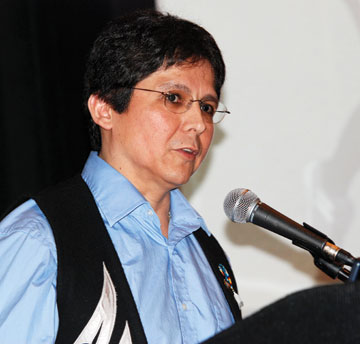 THUNDER BAY – “I believe First Nations people have to make the economy their first priority. The best social program is a job” Those were the words offered up by Chief Clarence Louie at Lakehead University last night. They were heard in a packed lecture theatre, two overflow theatres, and by tele-video in the Orillia campus of the University.
THUNDER BAY – “I believe First Nations people have to make the economy their first priority. The best social program is a job” Those were the words offered up by Chief Clarence Louie at Lakehead University last night. They were heard in a packed lecture theatre, two overflow theatres, and by tele-video in the Orillia campus of the University.
Chief Louie had met with the Mayor and Council of the city, and contrasted that “No one wants to live beside a poor neighbour”.
“You don’t have to fear natives taking over,” said the Chief. “We are not that mean”.
Louie’s message was heard by Walter Bannon of the Fort William First Nation who, in thanking the leader of the Osoyoos Indian Band for coming, commented that he respects his views and was glad to find someone with similar views on economic development.
Chief Louie is chair of The National Aboriginal Economic Development Board an advisory body to the Government of Canada. It provides advice to the government on strategies, approaches and programs aimed at promoting greater economic development for First Nations, Inuit and Métis in Canada.
It is an area Louie is well qualified for. His Osoyoos First Nation pumps $40 million into its local economy, operates an award winning winery and vineyard, a hotel, and several other businesses. Over 530 people are employed by the Band which has under 500 members. “Every person on the Osoyoos First Nation who wants a job, has a job,” stated Louie.
Chief Louie pointed out that of the $10.8 billion spend by the federal government by the Department of Indian and Northern Affairs that 96 to 98 per cent are spent on social programs, and only a small amount on economic development.
“The current formula doesn’t work”, states Louie. “The results are obvious”.
Earlier in the day, the outspoken Chief also spoke to an enthusiastic group of students at Sir Winston Churchill High School, and toured the Fort William First Nation.
Chief Louie recognizes Thunder Bay as unique in terms of its large aboriginal population, with a First Nations community on its front doorstep. He recognizes both the challenges and opportunities our Aboriginal population faces, and says, “I hope the Aboriginal people here take the initiative to become involved in the economy, just as much and as often as do non-Aboriginals. It’s important for community members to share the same standard of living and quality of life, no matter what their status or background. It’s also extremely important for non-Aboriginals to take the initiative to help bridge the gaps in building an inclusive atmosphere for all community members.”
Beverly Sabourin, Vice-Provost (Aboriginal Initiatives), sees Chief Louie as a national leader in progressive thought and action and says, “The Chief and his Band are a prime example of the value that stems from progressive initiatives surrounding economic development. We have benefited tremendously from his talks, particularly with regard to aspects concerning self-sufficiency and education among the Aboriginal population.”
Biographical Note: Clarence Louie was elected as Chief of the Osoyoos Indian Band in 1985. Since then, Chief Louie has worked to improve his community’s standard of living. Under his leadership, the Osoyoos Indian Band was incorporated and now owns and operates several businesses, such as a golf course, a construction company and retail stores. The band has also created the first Aboriginal winery in North America. The Osoyoos Indian Band Development Corporation employs hundreds of people. The Chief and his council have also established the Nk’Mip Desert Cultural Centre to promote and preserve Okanagan language and culture. Chief Louie has also taken part in successful settlement agreements of specific land claims, resulting in the acquisition of hundreds of acres of land to add to the reserve.
Chief Louie has received numerous awards, including the Economic Developer of the Year Award from the Council for the Advancement of Native Development Officers, the Inspirational Leadership Award from Aboriginal Tourism B.C., and the Business and Commerce Award from the National Aboriginal Achievement Foundation. He is also a recipient of the Order of British Columbia.
